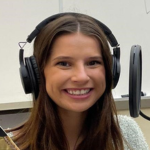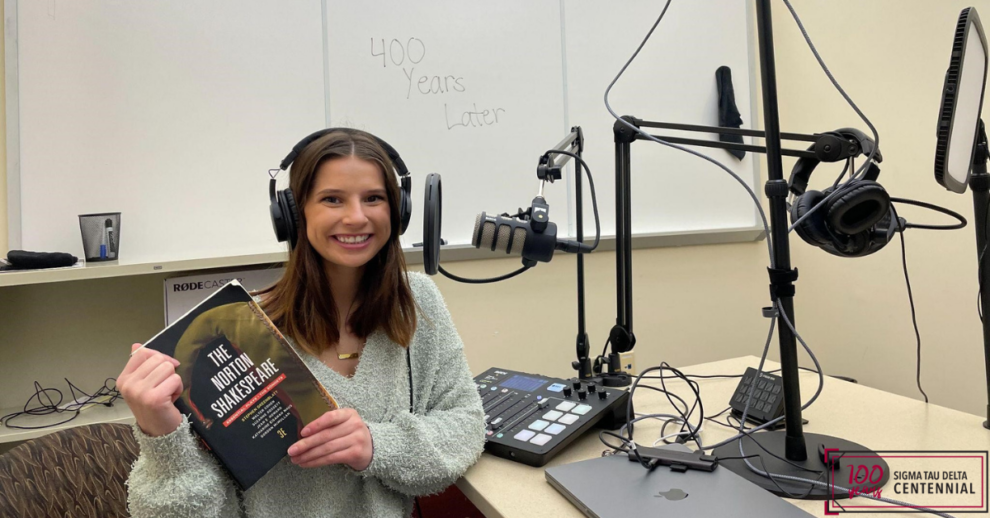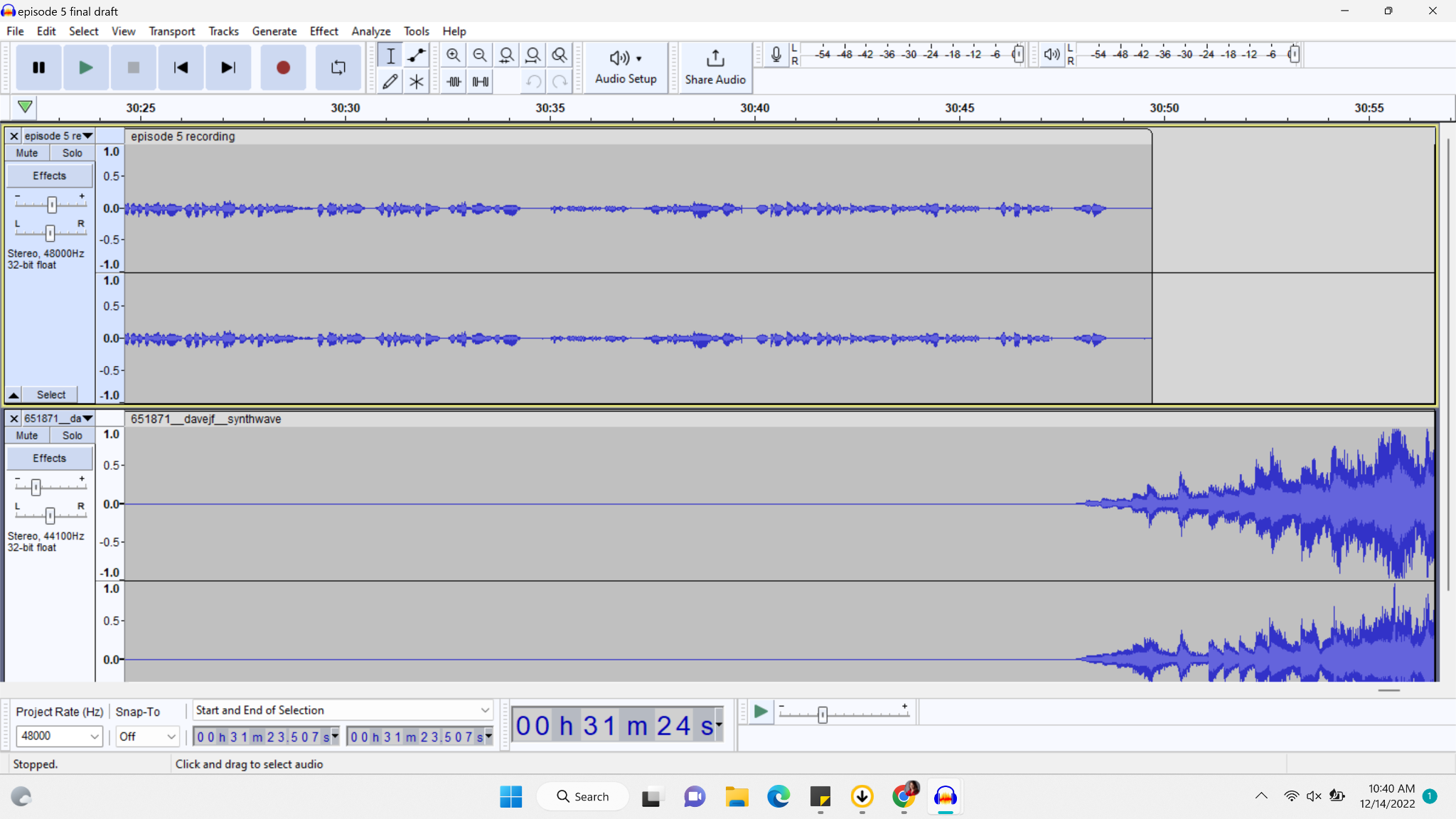Throughout my academic career, I have written at least ten formal papers about William Shakespeare’s plays. When given the opportunity to spend an entire semester independently learning about Shakespeare’s works, I decided to ditch the traditional mode of paper writing and instead present my studies in a medium I had never tried before: a podcast.
When some hear the word “podcast,” they might think of nationally known series like Serial or The Daily—two of my favorites—but it is a little less likely they consider podcasts’ association with digital humanities, let alone Shakespeare. Still, humanities podcasts are carving out a share of the market for themselves, and their efforts are not going to waste. A 2019 study by Edison Research and Triton Digital found that 74% of US podcast listeners listen for the sake of learning (31). So, it was only natural that, when faced with the problem of expanding my audience of Shakespeare-focused studies beyond my professor, a podcast was the obvious choice.
Rather than simply being a project for class, I wanted my podcast to be public and available for anyone anywhere. In this way, I carved out my own space as an undergraduate podcaster in the impressive world of Shakespeare podcasts mostly hosted by scholars or actors.
My goal was to join and meaningfully contribute to the dialogue on Shakespeare’s relevance. To share my own voice, I decided I would devote my podcast to showing how social issues in Shakespeare’s tragedies remain ever-present in today’s society. And, rather than just listing the problems common in Shakespeare’s time and our own, I proposed how listeners might learn from tragic characters. I titled the series “400 Years Later.” I decided to invite classmates as guests rather than producing a solo narrative. In preparation for each episode, I closely read a tragedy, focused on one character or issue, and consulted outside sources to incorporate into the conversation. Episodes varied on specific issues, ranging from the #MeToo Movement to mental wellness representation in film to US militarism to elder abuse.
I used the free and beginner-friendly platform Audacity to record and edit. This application was a great first stop to work out my technical ignorance and master the basics of podcasting. Then, I uploaded to YouTube.
As time progressed and I became more comfortable as a host, I eventually began recording in the podcast studio at my institution’s library. This transition improved not only the sound quality of my episodes but also improved that sometimes hard-to-find balance between informality and script.
Stronger than my goal to advocate for Shakespeare’s applicability, I was also hoping to build a series that might inform, entertain, and inspire people less familiar with literature or people with fewer financial resources. This ambition is not unique to me. Plenty of humanities podcasters share the same hope of making academia more accessible to the public (Howard-Sukhil, et al.). Scholars are right to turn to podcasts as the perfect outlet for this mission.
After all, it seems harder to find someone that does not listen to podcasts nowadays. Spotify, a giant in the audio streaming service industry, features a whopping 3.5 million different podcasts, all free to users. And there are listeners. The 2019 Edison Research and Triton Digital report found that approximately 144 million Americans listen to podcasts (4). Clearly, there is an audience. But why are podcasts successful? Why are they valuable in and out of the classroom?
Podcasts are taking the world by storm because they are accessible, flexible, and capable of fostering community. With podcasts free on most platforms, listeners do not have to dish out subscription fees, pay tuition at a learning institution, or buy a book in order to hear a good story or learn something new. This eliminates a huge financial barrier that routinely keeps large portions of the population out of continuous education. Additionally, listeners gain flexibility: podcasts can be played on smartphones, car radios, tablets, computers, and smart home products. Rather than sitting to read a book or watch a documentary, listeners may simultaneously perform day-to-day activities. Finally, as Dario Llinares points out in his book, Podcasting: New Aural Cultures and Digital Media, podcasts generate a supportive space for listeners (2). Barriers of anti-intellectualism and elitism are torn down. Social connections are made between hosts, guests, and listeners.
Just as listeners benefit from podcasts, students have the opportunity to experience professional and personal growth as educational podcast creators. During my journey, I learned how to better organize my thoughts on the spot and verbalize them effectively. I came to appreciate the value of using new technologies to advance scholarship. I also experienced a greater general excitement toward my studies in Shakespeare than ever before.
Ultimately, I today arrive at the same conclusion as Howard-Sukhil et al. that the podcast is a treasured “companion” to the traditional academic paper, not a competitor (8). For all of these reasons, podcasts should be considered a legitimate, useful medium to advance humanities scholarship.
Works Cited
Edison Research and Triton Digital. “The Podcast Consumer 2019.” The Infinite Dial 2019, 2019, pp. 1-43, www.edisonresearch.com/wp-content/uploads/2019/04/Edison-Research-Podcast-Consumer-2019.pdf.
Howard-Sukhil, Christian, et al. “Developing Research through Podcasts: Circulating Spaces, A Case Study.” Digital Humanities Quarterly, vol. 15, no. 3, pp. 1-13.
Llinares, Dario, et al. Podcasting: New Aural Cultures and Digital Media. Edited by Dario Llinares et al., Palgrave Macmillan, 2018, doi.org/10.1007/978-3-319-90056-8.
 Rachel Williams
Rachel Williams
Alpha Eta Pi Chapter, alum
Illinois Wesleyan University, Bloomington, IL
Sigma Tau Delta
Sigma Tau Delta, International English Honor Society, was founded in 1924 at Dakota Wesleyan University. The Society strives to
- Confer distinction for high achievement in English language and literature in undergraduate, graduate, and professional studies;
- Provide, through its local chapters, cultural stimulation on college campuses and promote interest in literature and the English language in surrounding communities;
- Foster all aspects of the discipline of English, including literature, language, and writing;
- Promote exemplary character and good fellowship among its members;
- Exhibit high standards of academic excellence; and
- Serve society by fostering literacy.
With over 900 active chapters located in the United States and abroad, there are more than 1,000 Faculty Advisors, and approximately 9,000 members inducted annually.
Sigma Tau Delta also recognizes the accomplishments of professional writers who have contributed to the fields of language and literature.







Add Comment